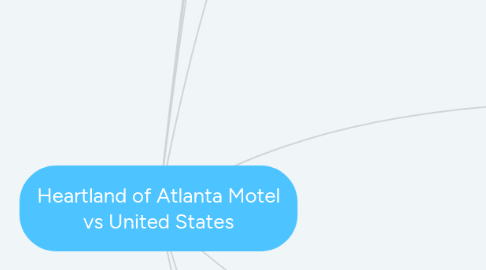
1. Facts
1.1. Parties
1.1.1. Heart of Atlanta Motel
1.1.2. U.S. Gov't
1.2. What Happened
1.2.1. Supreme Court overturned Plessy vs. Ferguson and ruled segregation in public facilities was unconstitutional.
1.2.2. Congress passed the Civil Rights Act of 1964
1.2.3. Heart of Atlanta Motel refuses accommodations to African Americans
1.2.4. Motel brings suit to overturn Civil Rights Act for exceeding interstate commerce clause
1.2.5. Motel claimed that its business was "of a purely local nature" and therefore not subject to interstate commerce regulations.
1.3. Procedural History
1.3.1. District court did not accept Motel's "local character" description of its business.
1.3.2. Basis of District Court's ruling was that the Motel was accessed by interstate roads, advertised nationally, and 75% of its customers were out of state.
2. Issue:
2.1. Does Congress have constitutional authority to dictate who a private business must serve?
3. Rule of Law
3.1. Commerce Clause
3.1.1. Congress has the right to regulate interstate commerce
3.2. Gibbons vs. Ogden
3.2.1. SCOTUS ruled that Congress can regulate interstate AND intrastate commerce when the intrastate commerce has a compelling impact on interstate commerce.
3.3. Wickard vs Filburn
3.3.1. SCOTUS ruled that Congress can regulate private activity that doesn't constitute a normal definition of "commerce" (sale of goods/services), but indirectly impacts interstate commerce.
4. Analysis & Application
4.1. U.S. Gov't Point of View
4.1.1. Congress has the right to regulate businesses by the power of the Commerce Clause
4.2. Motel's Point of View
4.2.1. The motel's business is inherently local and therefore not subject to Commerce Clause powers of Congress, nullifying the Civil Rights Act.
4.3. Compelling Facts/Analysis of Motel Business
4.3.1. Testimony of Under Secretary of Commerce demonstrated "voluminous" instances of Black motorists being denied accommodations while traveling between states.
4.4. Compelling Facts/Analysis of Heart of Atlanta's Business
4.4.1. 75% of the Motel's customers were out of state which contradicts the claim of it being "purely local" in nature.
4.5. Legal Precedent
4.5.1. Previous SCOTUS rulings have demonstrated that Government has broad authority to regulate direct and indirect commerce that is interstate and intrastate in nature
4.5.2. Aside from Commerce related issues, segregation in public facilities had been struck down.
4.6. Ruling
4.6.1. The Court ruling in favor of the U.S. Gov't/Civil Rights Act was not an expansion, narrowing or re-interpretation of the law.
4.6.2. The broad scope of power given to the U.S. Gov't by Wickard vs Filburn should've made it clear this case was going to be ruled in favor of the Defendant.
4.6.3. Motel business by its very nature is hinged on travel which necessarily involves roads - the backbone of interstate commerce or intrastate commerce that impacts interstate commerce.
5. Conclusion
5.1. Heart of Atlanta Motel was forced to accept patrons of all ethnicities.
5.2. The businesses proximity to interstate highways and impact on interstate commerce and travel were overwhelming factors in the 9-0 decision.
6. Impact
6.1. Save Our Aquifer vs. City of San Antonio
6.1.1. Federal judge cited the Heart of Atlanta case to show that, "The role of the federal courts is of limited jurisdiction to instances where the elective political process is unresponsive to Constitutional and federal statutory dictates and principles" such as in desegregation.
6.2. National Association of Home Builders vs. Babbit
6.2.1. "Second, the prohibition on takings of endangered animals falls under Congress' authority "`to keep the channels of interstate commerce free from immoral and injurious uses.'" " Final quote taken from Heart of Atlanta case.
6.2.2. Babbit was a Secretary of Interior being sued because Fish and Wildlife Service was violating a builders group in CA for construction work that impacted endangered species in the area.
7. Importance
7.1. Segregation was the de facto denial of service to people based on religious, biological, or ethnic traits.
7.2. Landmark progressive legislation almost necessarily goes through immediate court challenges by institutions and people that aren't ready to change.
7.3. SCOTUS's Heart of Atlanta decision made it clear that not only public facilities, but also private facilities that in any way are under the jurisdiction of the commerce clause will offer service to all people regardless of their status within the enumerated protected classes.
7.4. In the example of a healthcare practitioner, the case shows that there's no legal basis for denying care to a person based on their status in a protected class. Healthcare is a business and plays an important role in the ability for people to take part in commerce and as such would be subject to regulations under the commerce clause.
8. Influence
8.1. Hiring Practices
8.1.1. Enshrined in the Civil Rights Act, Businesses are not allowed to discriminate against protected classes in their hiring practices.
8.2. Wage & Promotion Practices
8.2.1. Businesses are also no t allowed to discriminate against protected classes in wages or promotions offered.

